- Home
- Fannie Flagg
Standing in the Rainbow Page 2
Standing in the Rainbow Read online
Page 2
One such radio homemaker was Bobby’s mother, Mrs. Dorothy Smith, who broadcast from her home in Elmwood Springs, Missouri, between 9:30 and 10:00 A.M. over local radio station WDOT, number 66 on your dial. She was certainly qualified for the job. Besides loving to talk she had gone to Boston to study and had come home two years later armed with a degree in home economics and child care and with her eye on Robert (Doc) Smith, who had recently graduated from the University of Tennessee’s School of Pharmacy. Six months later they were walking down the aisle of the First Methodist Church, anxious to settle down and start a family. By the end of the war, she had been broadcasting since 1936 and over the years became known to her many listeners as, simply, “Neighbor Dorothy.” Every day, Nalon Klegg, the male announcer from the main station in Poplar Springs, would introduce her with the phrase “And now here she is from that little white house just around the corner from wherever you are, your neighbor and mine, the lady with the smile in her voice, Neighbor Dorothy . . . with Mother Smith on the organ.” Her mother-in-law would then break into a rousing rendition of the show’s theme, “On the Sunny Side of the Street.”
This theme song was not chosen by accident. When Doc bought the house in 1934, he knew his wife would love to have plants blooming in every window, in and among all the little blue-glass violins she collected, so he made sure the new house really was on the sunny side of the street. Neighbor Dorothy was a pleasingly plump woman with a sweet smile on her face, a face that eventually graced the cover of her cookbooks and billboards all over the Midwest. Most people, seeing her picture or listening to her calm and friendly, always cheerful radio voice, might never have guessed she had ever had a worry or a problem in her entire life. What most people did not know and she never talked about was their first child, a four-year-old little blond boy named Michael. Dorothy had thought it was just another childhood fever or maybe a cold coming on, certainly nothing serious. But by midmorning he had started going into convulsions. He died quite suddenly and with little warning. One day he was laughing and alive and the next day he was gone.
The doctors said it had been an unusually virulent bacterial infection that had hit him overnight and by five-thirty that afternoon he was dead. They never found out exactly what it was or why he had gotten it but by the time they reached the hospital the infection had already spread and settled in his lungs. No one can ever really be prepared for the death of a loved one but losing a child is surely the worst pain a human being will ever have to bear.
It struck them so suddenly and so hard that Doc’s mother, a widow, moved into the house to take care of them. After a while Doc went back to work but Dorothy was still unable to do anything except sit in the little boy’s room and stare at the bed.
She wouldn’t eat no matter how Mother Smith tried and she couldn’t sleep unless she took one of the pills Doc got for her. Though the doctors repeatedly told her there was nothing anybody could have done, she never really believed it. She questioned it over and over in her mind. She asked herself a hundred whys and what-ifs and she couldn’t find one answer that made any sense. At that time Doc was little or no help. If anything, she resented the way he had seemingly just gone on with his life as if nothing had happened. He wouldn’t even talk about it with her and when she tried he just walked out of the room. She was young and did not know that men deal with grief in different ways. Doc, who was also young, was mistakenly trying to hold himself together to be strong for her. She did not know that he often drove outside of town, parked the car, and sat and sobbed.
The loss of their child was a wound that would not heal, something they would never really get over. But, after a year or so, they were both able to make it through the days.
It was at this time that Dorothy first began to bake. It helped her, somehow, to keep busy. There were days when she baked as many as five or ten cakes. Pretty soon everybody in town started carrying forks in their pockets or pocketbooks because if you passed her house, you would be offered a piece of cake. Soon she was overrun with cakes and needed desperately to get rid of them so when she said, “Please come in and have a piece of cake,” you knew she meant it. Gerta Nordstrom, her friend who owned the bakery, said her cake business dropped in half because Dorothy was giving so many away. Pretty soon Dorothy began supplying the Nordstroms and became well known for her baking. The year her recipe for a six-layer surprise upside-down pineapple cake took second place in the Pillsbury Bake-Off contest she was invited to be a guest on a radio show in Poplar Bluff. In the midst of the interview she just happened to mention that she always used Golden Flake Lite-as-a-Feather Flour. When Golden Flake Flour sales doubled overnight, they offered her a show of her own. Soon the large radio tower with the red light on the top went up in the backyard and she was “on the air.” Later, after Anna Lee was born, she and Doc began to be their old selves again, although the little blond boy was not forgotten. Life went on pretty much as usual until, one day when Dorothy was forty-three, long after either one of them had given it a thought, life changed again. The doctor informed her that she was not, as she had suspected, going through the change of life but was pregnant. And seemingly out of a clear blue sky, along came Bobby, who turned out to be a real change-of-life baby in every sense of the word.
The Water Tower
MAYBE IT’S BECAUSE they are still short and close to the ground or maybe their senses have not yet been dulled by the years but to children days seem longer, smells stronger, colors brighter, noises louder, fun more fun. Bobby was no exception. He viewed the world each day through brand-new eyes, almost vibrating with excitement. If you could have plugged him into the wall he would have lit up like a 500-watt bulb. This was all very well and wonderful for him but for his family it was like living with a sixty-eight-pound puppy running in and out of the house all day. And this day, as usual, he and Monroe were up to something they shouldn’t be.
They had walked almost a mile outside of town, to the water tower that had ELMWOOD SPRINGS written on it in huge black letters, with the express intention of climbing all the way to the top. An idea that if his mother knew anything about would have caused her to have a heart attack or worse. Years before, a high school senior had fallen off and killed himself. But when you’re young facts do not concern you. You are convinced that nothing will ever happen to you. Besides, he and Monroe had double-dog-dared each other to climb it, so there was no turning back.
Secretly both of them were a little nervous. Scared that they might chicken out at the last minute. But overriding any fear of being called a sissy by the other was the lure of being able to brag to everyone they knew, except their parents, that they had climbed it. And just to make sure that everybody would know for certain they really had done it, Bobby had come up with a plan.
That morning he had gone over to Warren’s Hardware and bought a large ball of heavy string. Monroe had a pocketful of red balloons that they were going to blow up and tie to the top of the tower to prove to any nonbelievers that they had been there. But when they finally arrived at the base of the tower and looked up, what had appeared from a distance to be just a round silver ball hanging up in the sky now seemed as big as a football field. It was so high it hurt their necks to look up at it. People said that from the top if you turned around in a circle you could see six states and on a clear day you could see all the way to Iowa . . . at least that’s what they said. Bobby and Monroe hemmed and hawed and kicked the ground a little and discussed the balloon plan.
“Do you think we should blow them up before we go?” asked Monroe, stalling for time.
“No. Don’t you remember what we said? If we blow them up first, somebody might see them while we’re climbing up.”
“Oh, that’s right.”
“When we get to the top, we blow them up and tie them to the side, then get down as fast as we can.”
Monroe, a chunky, carrot-topped boy with pinkish skin, suddenly looked a little pale. He glanced back up at the top. “Who’s gonna go first?”
Bobby thought about it for a minute but made no move. Then Monroe said, “This was your idea. I think you should get to go first.”
“No, it’s O.K., you can go first if you want to. I don’t care.”
“No, fair is fair. You’re the one who thought it up—you go.”
Monroe had him there, so Bobby could not very well back down now. “O.K., if you’re scared, I’ll go first if you want me to.”
“I’m not scared, it was just your idea, that’s all.”
“Then you go first if you want to.”
Monroe looked back up at the top. That settled it. “I don’t want to.”
Bobby assumed a nonchalant attitude. “All right, I’ll go first, but remember—Macky Warren said the trick is not to look down until you get up there.”
“O.K.”
“All right then, let’s go.” Bobby took a deep breath and put his foot on the first rung of the ladder and started up the long, thin steel stairs that led to the top. As they both soon found out, it was a long and steep climb. What they had not counted on was how hot the sun would be the higher they got or how hard it was to hold on to the slippery rails with sweaty hands, not to mention the wind that almost blew them off the ladder. After what seemed an hour of climbing, they finally made it, both of them out of breath, dripping wet with perspiration, hot, and thirsty. When they stepped off the ladder onto the small, round corrugated-steel platform at the very top, their legs were so shaky from the climb that they had to sit down and rest. Monroe’s face was now about as bright red as the balloons in his pocket.
After a while they mustered the strength and the courage to stand up and look over the side. The first thing Monroe said when he looked over was: “Whoa! . . . We must be ten thousand hundred feet up in the air . . . higher than an airplane or the Empire State Building even!”
They weren’t, of course, but you sure could have fooled them. Bobby and Monroe had never seen the world from anything higher than a tree or the top of a garage. They could see for miles around, and when Monroe spotted a cornfield way off in the distance he was positive he had seen all the way up to Iowa.
Bobby was so overwhelmed at the sight he was speechless. He stood there stunned. He had not known what the world would look like from this far up. He had thought maybe it would look round, like the world globe in his father’s den, but to his surprise it was all flat! Nothing before him but big flat brown and green squares as far as the eye could see. It looked just like a map! But when Monroe spotted their town off to the right and pointed it out, Bobby was in for the second shock of his young life. “Look,” Monroe said, “there’s the church and the school—see it?”
Bobby’s mouth hung open in total disbelief. Elmwood Springs, which an hour ago had seemed to him to be such an enormous place, was now nothing more than a block of buildings, houses, and streets no bigger than an inch, just stuck sitting out there in the middle of nowhere. He could see where downtown was, the church on one end and the Masonic Hall on the other. The small black specks walking back and forth were no bigger than ants, and the cars looked like Matchbox toys; the buildings were the same size as the ones in a Monopoly set.
Monroe said, “Look, there’s your house . . . see the radio tower in the backyard?”
Bobby peered over to where Monroe was pointing. It was his house all right. He could see the red light on top of the radio tower and if he squinted he could just make out a black speck moving around in the backyard, hanging clothes on a clothesline. Then it struck him: that speck was his mother! At once another thought hit him, scaring him half to death. What if he were at home right now and out in the yard and somebody else was up here looking down at him? Then he would be no bigger than an ant. No, half an ant . . . no bigger than a flea! From up here he would no longer be the huge center of his huge universe, the apple of his parents’ eyes; from up here he would be nothing and nobody special, just another black dot. Suddenly he broke out in a cold sweat.
“I’ve got to go home, my mother’s calling me,” he said. He started back down, leaving a startled Monroe calling after him: “Wait. You can’t go . . . we haven’t done the balloons yet. Wait!”
But Bobby did not hear him. All he could hear was the sound of his own heart pounding in his ears and his only thought was to get on the ground as fast as he could. He had to get back home, where he was the right size.
But Monroe, who had been deserted, abandoned, was not going to leave. He was determined. If he had climbed all the way to the top, people were going to know about it. The heck with Bobby Smith; he would just blow up the balloons himself. As he pulled one out of his pocket and started to blow, he suddenly remembered. He ran to the side and yelled down the ladder. “Bobby, wait, stop, you’ve got the string! Throw me the string!” But it was too late. Bobby was more than halfway down the ladder.
Sometime later Bobby hit the front door of his house running and didn’t stop until he got to his room and onto his own bed. When Anna Lee, who was out on the porch, saw the look on his face as he went by, she figured someone was chasing him. She got up to look and see if it was Luther Griggs, the big bully who was always beating Bobby up any chance he got, but Luther was nowhere in sight.
Poor Monroe had stayed up on the tower for at least another forty-five minutes, trying as hard as he could to attach one of those red balloons to the side of the railing, but they all flew off.
But for Bobby the day had been far more than just the failure of the balloon caper. It was the first time he had seen his life from a distance or from anywhere, for that matter, except from the center of his own giant universe. Could it really be possible that he was nothing but just another small dot among a bunch of other small dots? He had always thought he was something different, something special. Now he was thrown for a complete loop.
Raggedy Ann
THAT NIGHT Bobby was especially sweet and after dinner, when they were all out on the porch, he went over to his mother in the swing, lay down with his head in his mother’s lap, and went to sleep, something he had not done since he was six. It was an extraordinarily warm evening and the entire family, including Jimmy, and Dorothy’s red-and-white cocker spaniel, Princess Mary Margaret, all sat out trying to catch a little night breeze. It was a quiet night and they were enjoying the sound of the crickets and the soft squeak of the swing. Dorothy looked down at Bobby. He was now in such a deep sleep that when she crossed her legs with his head in her lap he did not awaken. She smoothed his hair back off his forehead. “He must have been up to something today because he’s dead to the world tonight.”
Anna Lee said, “I thought Luther Griggs was after him again. He ran in the door this afternoon going about a hundred miles an hour.”
His mother sighed. “I’m worried that the Griggs boy is really going to hurt him one of these days. He’s already a head taller than Bobby.”
Doc knocked the ashes out of his pipe against the side of the porch. “Oh, I wouldn’t worry too much. He’ll have to catch him first. Bobby may be little but he’s fast.”
Dorothy thought about it and was somewhat reassured. “Well, that’s true. The other day, by the time I got my switch he was out the door and so far out in the field all I could see was the top of his head.”
Anna Lee, who, now a teenager, had recently started referring to her brother as “that child,” made an observation. “That child is certainly a lot of trouble, isn’t he, Mother?”
“Yes, but he can be sweet when he wants to. He’s just at that age, I suppose.”
“Was I ever like that?” asked Anna Lee.
“No. You were just a little angel—wasn’t she, Mother?”
Mother Smith agreed. “Absolutely. You were the best-behaved little girl. I used to take you everywhere with me and all I had to do was to put you down with one of your little dolls and you’d sit there and play and I never heard a peep out of you.”
“You loved your dolls,” Dorothy said. “That big Raggedy Ann was your favorite; you used to take
it everywhere.”
They sat there in the quiet listening to the crickets for a few more minutes. Then Dorothy turned to Anna Lee. “What ever happened to your Raggedy Ann doll?”
“Bobby knocked its head off.”
“Oh.”
Just then Tot Whooten, a frazzled-looking woman, walked by on the sidewalk headed somewhere in a hurry. She did not stop but waved her hand in the air and called out over her shoulder, “Momma’s left her purse at the picture show again and I’ve got to get there before they close.”
Mother Smith shook her head. “Poor Tot, that’s the second time this week.”
Dorothy agreed. “Poor Tot.”
A few minutes later, Tot came walking by again, this time with her mother’s huge black purse on her arm. Mother Smith called, “I see you got it.”
“Yes, thank heavens Snooky found it and was waiting for me. Good night.”
They all said, “Good night.” Mother Smith added, “Tell your mother I said hello.”
“O.K.”
And after she was out of earshot Dorothy said “Poor Tot” again. Several other people walked by on their way home from the movie and waved. After a moment, Dorothy said, “I wish Bobby hadn’t done that to Raggedy Ann. I was hoping you could give it to your little girl someday. You just loved that doll. You even took it to first grade with you.” She looked at her daughter with a sad, wistful expression in her eyes. “It seems like only yesterday when I was taking you to your first day of school.”

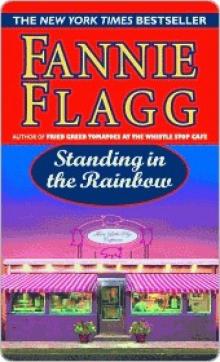 Standing in the Rainbow
Standing in the Rainbow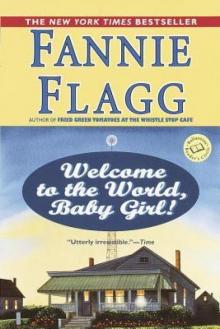 Welcome to the World, Baby Girl!
Welcome to the World, Baby Girl!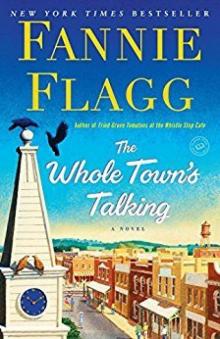 The Whole Town's Talking
The Whole Town's Talking A Redbird Christmas
A Redbird Christmas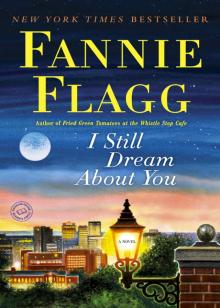 I Still Dream About You
I Still Dream About You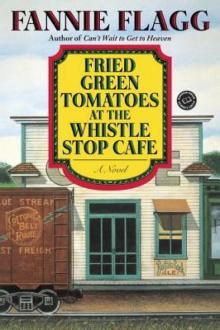 Fried Green Tomatoes at the Whistle Stop Cafe
Fried Green Tomatoes at the Whistle Stop Cafe Can't Wait to Get to Heaven
Can't Wait to Get to Heaven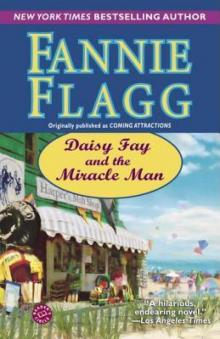 Daisy Fay and the Miracle Man
Daisy Fay and the Miracle Man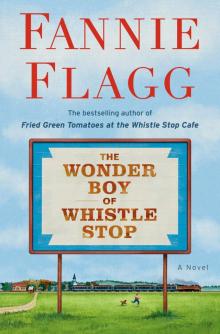 The Wonder Boy of Whistle Stop
The Wonder Boy of Whistle Stop The All-Girl Filling Station's Last Reunion
The All-Girl Filling Station's Last Reunion I Still Dream About You: A Novel
I Still Dream About You: A Novel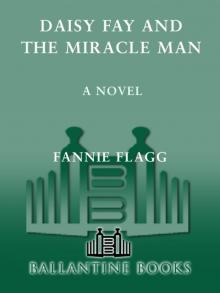 Daisy Fay and the Miracle Man: A Novel
Daisy Fay and the Miracle Man: A Novel